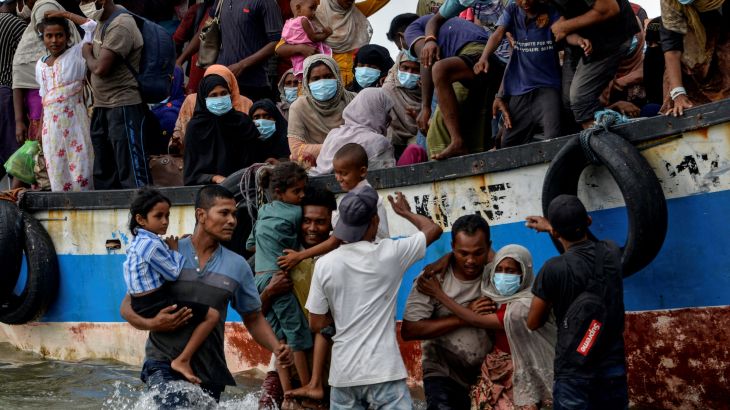Call to save Rohingya refugees adrift at sea without water, food
Governments asked to launch search and rescue mission amid reports of refugee deaths on vessel drifting for weeks.

A group of politicians in Southeast Asia has urged regional governments to immediately launch a search and rescue operation for a boat reported to be carrying hundreds of Rohingya refugees that has been adrift in waters off the coasts of Thailand, Malaysia, Indonesia and India for weeks.
The appeal from the ASEAN Parliamentarians for Human Rights (APHR) on Tuesday came as media outlets in India said the boat – which could be carrying hundreds of refugees including women and children – had drifted from the Malacca Strait and into Indian waters off the Andaman and Nicobar Islands.
Keep reading
list of 4 itemsUN urges Southeast Asia governments to rescue stranded Rohingya
Two Rohingya camp leaders killed in Bangladesh
A rare look inside Bangladesh’s island camp for Rohingya refugees
The Quint news website cited satellite coordinates that the captain of the stricken boat gave to a Rohingya refugee – Mohamed Khan Rezuwan – in Bangladesh’s Cox’s Bazar during a phone call on Sunday.
“We are dying here,” the captain told Rezuwan, whose sister and five-year-old niece are also on the boat.
At least three people on board the boat had already died due to starvation and dehydration, Rezuwan told India’s The Print newspaper.
“The situation is very concerning. They do not have water or food,” he was quoted as saying.
Please listen to the voices of the 160 Rohingya people stranded at Andaman for over 3 weeks! @Refugees @UNHCRAsia @amnesty @AJEnglish @IndianExpress @UNHumanRights @UNHCR_BGD @POTUS @SecBlinken @trtworld @CNN @OIC_OCI @RefugeesIntl @MEAIndia @arielmou @indiannavy @narendramodi pic.twitter.com/DMQyapv3tO
— MohammedkhanRezuwan (@Khan_RZW) December 18, 2022
The United Nations refugee agency highlighted the plight of the Rohingya refugees on the boat earlier in December when it called for an urgent search and rescue operation. At the time, the UN agency said the “non-seaworthy” boat could be carrying up to 200 people, though Indian media reports put the figure at about 160.
In their statement on Tuesday, the group of Southeast Asian legislators called on member states of the Association for Southeast Asian Nations (ASEAN) and other countries in the region to fulfil their humanitarian obligations and rescue those on board the boat.
“It is disgraceful that a boat filled with men, women and children in grave danger has been allowed to remain adrift,” said Eva Sundari, board member for APHR.
“Neglecting the people on the boat is nothing short of an affront to humanity,” she said.
The boat reportedly set off from Bangladesh – host to hundreds of thousands of Rohingya refugees who fled persecution in their home country of Myanmar – in late November with the aim of reaching Malaysia.
The vessel has been adrift since December 1 when its engines failed and is one of several boats carrying refugees that had been reported adrift in recent weeks.
On December 8, a boat carrying 154 Rohingya refugees was rescued off the coast of Thailand by a Vietnamese oil service vessel. The refugees were handed over to the Myanmar navy.
On Sunday, the Sri Lankan navy rescued another boat carrying 104 refugees, including 39 women and 23 children. The navy said the small trawler had set off from Myanmar and was on its way to Indonesia when it ran into engine trouble.
The UN refugee agency reported earlier this month that there had been a “dramatic” increase in Rohingya refugees making risky boat journeys from Myanmar and Bangladesh to Southeast Asian countries, partly because of deteriorating conditions in the refugee camps they are confined to in Myanmar’s Rakhine state and Bangladesh’s Cox’s Bazar.
An estimated 1,920 mostly Rohingya people left Myanmar and Bangladesh by sea between January and November this year, compared with just 287 in 2021, according to the UN.
About 119 people were reported dead or missing on these journeys, the UN added.
The APHR said on Tuesday that Southeast Asian states needed to address the root cause of the crisis, including putting pressure on authorities in military-ruled Myanmar to restore citizenship to the Rohingya and to repatriate the nearly one million refugees living in camps in Bangladesh.
“ASEAN and the international community at large have stood idly for too long as the Rohingya tragedy unfolded over the years,” said Kasit Piromya, an APHR board member and a former Thai minister of foreign affairs.
“Those countries who claim to defend human rights have a moral obligation to address the root causes of the human rights crisis afflicting the Rohingya, or these humanitarian tragedies will only repeat again and again.”